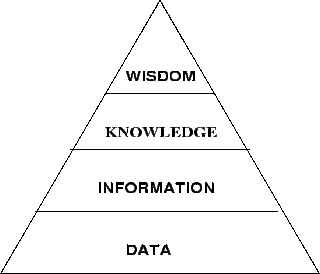Knowledge can be defined as the “understanding obtained through the process of experience or appropriate study”. It is an accumulation of facts, procedural rules, or heuristics. It can be developed over time through successful experience, and this experience can lead to expertise. It is usually based on learning, thinking and proper understanding of the problem area. Knowledge is derived from information in the same way that information is derived from data. This can be seen in the following diagram. [1]
Figure 01: Data, Information, Knowledge and Wisdom
There are many knowledge classifications. According to Quinn, Anderson and Finklestein’s definition, they define four types of knowledge below. Processes and technology can address the first three points, whereas the last point emphasises the human element that differentiates knowledge management.
- Cognitive Knowledge – Know What
- Advanced Skill – Know How
- Systems Understanding – Know Why
- Self Motivation – Care Why
Another knowledge classification is taken from Hope & Hope (
- Explicit – skills and facts that can be written down and taught to others
- Tacit – skills, experience and native talent that people cannot easily describe. [2]
According to Figure 02 below, knowledge can be created through teamwork. A team can commit to perform a job over a specific period of time. When the job is completed, then the team compares the experience it had initially to the outcome. This comparison translates experience into knowledge. While performing the same job in the future, the team can take corrective steps and/or modify the actions based on the new knowledge they have acquired. Over time, experience usually leads to expertise where one team (or individual) can be known for handling a complex problem very well. [3]
As we collaborate as a team in this course, our new knowledge can be created through the utilization of the below diagram. By now, each of us has been contributing his/her knowledge and experience to the specific tasks. No matter it is the successful or disappointing outcome, if we share our outcomes and compare with our initial knowledge, I am sure that new and better knowledge can be obtained.
Figure 02: Knowledge Creation/Knowledge Sharing via Teams
References
[1]
[2] Oilit.com 2005, E&P Knowledge Management, accessed on 11 April 2009, http://www.oilit.com/2journal/2article/0001/Knowledge%20Management%20Overview_files/KMarticle.htm.
[3]

